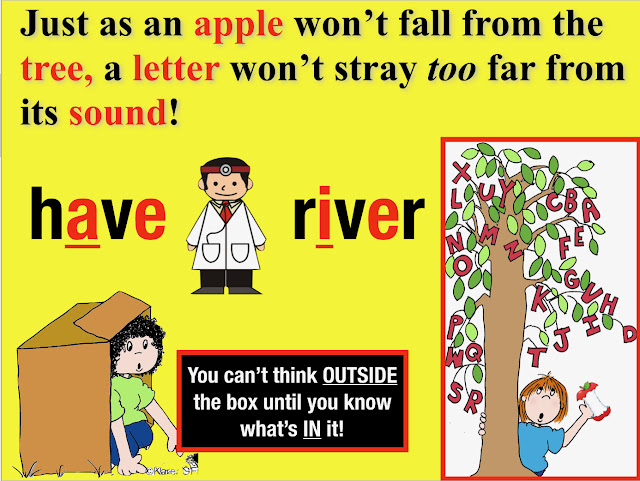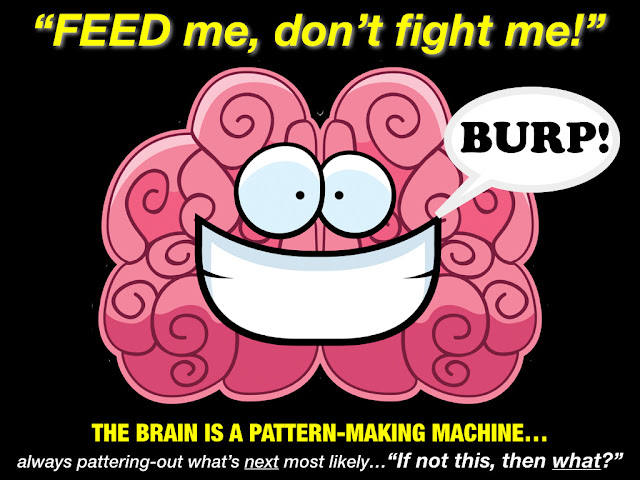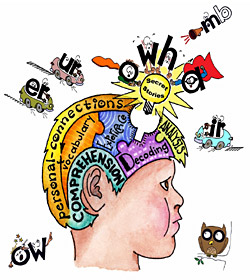Word Doctor Training
Because doctors know that the plague is the least likely cause of your symptoms, and that the flu is the most likely, they will probably go with the flu first and then work their way through the “next most likely” options, as needed.
Medicine is not an exact science, and doctors must use what they know to determine what’s most likely to be effective. They work through these options based on a hierarchy of likelihood.
Like medicine, the English language and is not an exact science, and while phonics is the key to learning how to read, it often takes a binary form, with words either falling squarely under under the “rule” or the “exception” categories. However, when we align abstract phonics skills with human behaviors that mirror kids’ own behaviors, their “most” and “next-most” likely sounds become easily predictable, even for kinders….and even if they’re exceptions!
Good word doctors armed with the Secrets can “treat” these so-called exceptions by employing the same cognitive flexibility that doctors apply when diagnosing patients. The first thing a good word doctor must know is that there are only so many different sounds a letter or phonics pattern can make. Their sounds are not random, even though they may appear that way sometimes.
Just like the old saying “Apples don’t fall far from the tree,” letters don’t fall far from their sounds. For example, you will never see the letter q say “mmm,” or the letter k say “duh,” or the tion phonics pattern say “ing”….
…as contrary to popular belief, letters don’t just lose their little letter-minds and run amok! All they do (and it’s usually the vowels that do this) is make a sound that they’re perfectly capable of making, but it’s the NEXT most likely one! Watch the video clip below to see what I mean!
When working with patients, doctors must use what they know to figure out what they don’t. The must think analytically and diagnostically. “What’s the best course of attack? What should I try first, and if that doesn’t work, what should I try next?” This process continues until all options are exhausted and there is nothing left to try. That’s when the patient is sent to a specialist who can “recognize” what’s too difficult to diagnose. (Much like exceptions that can’t be decoded must be memorized.)
Just like real doctors, word doctors need to use the Secrets they know to figure out the parts of the words that they don’t. They must practice the same cognitive flexibility that doctors use when sounding out unknown words- “What else can it be? What else could I try?” This type of analytical, problem-solving is akin to “thinking outside the box,” and for kids to do this effectively they must first know what’s IN the box. In other words, they must know the phonics Secrets!

This is why earlier and faster access to the code is so important for beginning and struggling readers, as only once kids know what’s IN the box are they able to think outside it!
The Secret Story of ou/ow…
Ou & ow play really rough and someone always gets hurt and says— “Oooowww!”
(like in the words: how, now, round, house, etc.)
But, flying overhead is Superhero O, who happens to their all-time, favorite superhero, ever! Whenever he flies by, they will always stop dead in their tracks and yell—“O! O! O!” That’s why the default sound for ou/ow is the long o sound!
(like in the words: know, though, blow, dough, etc.)
The Secret makes sounding out the words with this phonics pattern easy, even in kindergarten! Words like how, now, about, around, know, grow, though, etc., that are commonly found on sight word lists don’t have to memorized, as kids can just READ them! Plus, because it relates back to what kids already know and understand, they can learn (and start using) the ou/ow Secret even if they haven’t yet mastered all the individual letters and sounds. yet because it makes sense to them.
Alternatively, memorizing a sight word can take multiple repetitions and seemingly take forever for some students to master, especially if there is little home support. More importantly, memorizing a sight word lets you read ONE word, whereas knowing a Secret lasts you read thousands!
Consider the word you…
The ou isn’t doing what it should according to the Secret. Even still, its sound hasn’t fallen too far away… at least not so far that a good word doctor can’t still figure it out.
And here’s how…
1. First, try the most likely Secret Stories sound for ou (as in house)….. NOPE, it didn’t work!
2. Next, try the individual sounds for the letters o and u ….. BINGO!!! We got the word!!
In this case, we got it on the second try.
Now, had we not struck gold on our first “out-of-the-box” attempt, we could have worked our way further down the list of possible sound options and turned this puzzle into a sort of problem-solving/critical thinking game….
3. Try the sounds of other Secret Stories patterns with o or u, like the Secrets for oo, oi/oy or ous. For example, in the word could, the ou is making the default-sound for oo (as in book) and kids who know the oo Secret might try that sound as one more possible option.
Thinking Vowels® / Head-Bop
And of course, the Thinking Vowels® head-bop trick is another great word doctor-tool to help kids decode those otherwise “undecodable” words, like of, come, love, some, what, was, etc.. (Learn more about Thinking Vowels® here or click on the picture below for the video.)
4. It’s the PLAGUE! It requires a specialist! When we’ve exhausted all options and have no more tricks up our sleeve, we must surrender to the word, which means we have to memorize it!
Why Not Just Memorize These Tricky Words?
Here’s why— because it is within this “figuring-out” process that cognitive flexibility is strengthened and opportunities for deep learning lie! Not just learning how to read, but learning how to think! Our brain is a pattern-making machine, and this patterning process of thinking-through all available options is its natural way of doing things. “If not this, then that…” Our brain is continually “patterning-out” the best available options in everything that we do…
We think… “I’ll park in the front, but if I can’t find a space, I’ll try the back, and if that doesn’t work, I’ll try the next lot over. If I can’t find anything there, then I’m giving up and going home, as I’m too tired to walk that far.”
We don’t think….“If I can’t park in the front WHAT WILL I DO?
This is similar to the way kids often deal with words that are exceptions, throwing their hands up in surrender whenever the letters aren’t making the sounds that they should.
However, this is not the brain’s system for learning. Our brain always has a back-up plan, a “next most likely” option to try if the first one doesn’t work. Much like the way doctors diagnose patients. They don’t just try one course of attack and then throw their hands in the air and give up. And good word doctors can’t either.
“Human beings are pattern-making machines. That’s a key to our survival instinct— we seek out patterns and use them to predict the future. Which is great, except when the pattern isn’t there, then our pattern-making machinery is busy picking things out that truly don’t matter.”
—Seth Godwin, author of Looking for Patterns (Where they don’t Exist
The Brain is a “Pattern-Making” Machine
Our brains are hardwired to look for patterns, and the Secrets are patterns— not abstract letter patterns, but patterns of behavior that are designed to mimic learners’ own behavior. The ability to classify incoming information quickly into categories (based on the patterns we know) means the brain can use easier rules to deal with the new input, which is less stressful than always having to deal with things that haven’t been seen before. Knowing the Secrets equips inexperienced beginning and struggling learners to identify the best course of action when sounding out new words, and not knowing the Secrets means having to say, “It just is… It just does… You just have to remember….” when they can’t read or spell a word.
Another benefit to reading words rather than just memorizing them is that it sparks more optimal brain circuitry, as evidenced by numerous studies, including a recent one by Stanford University Professor, Bruce McCandliss, which you can read more about here.
 |
| Decoding Sight Words with Phonics Secrets |
It just is. It just is. You just have to remember.
Before you read any further, watch this video.
It’s easy for teachers to empathize with Ricky’s struggle to read words like: boughs, through, rough, cough and enough. Like many students in our guided reading groups, Ricky diligently attempts to decode what seem to him to be ‘un-decodable’ words and becomes understandably frustrated in the process. Ultimately, Ricky just closes the book and gives up, convinced that the sounds letters make just don’t make sense. Many of our students feel the same way.
In the same way that a doctor works through various options to heal a patient, we can do the same to “heal” the words that are stumping Ricky…. or at least to help make them more “figureoutable!” ( I know it’s not a word, but I really like it!)
First, we need to learn a Secret…
 |
| Click here to learn the gh Secret |
The Secret Story of gh
Gh will make different sounds, depending on where they are in line (i.e. in a word)
When they are at the FRONT, they’re glad!
There, they make the hard g sound, saying….
“Gosh, this is great! We get to go first and get in before anyone else goes!”
(ghost, ghoul, ghastly, etc…)
When they are in the MIDDLE, and surrounded by lots of other letters,
they are silent and are too afraid to say anything and make NO SOUND at all
(sight, thought, straight, etc…)
When they are at the END, they’re not at all happy and they always complain.
Here, they make the fff sound, saying….
“This is no fun! We’re so far away it’ll take forever for us to get to the front!”
(rough, enough, cough, etc…)
Playing Word Doctor

bough
No problem with the ou as it is doing just what it should (see ou/ow poster up above)
But gh is a different story, as it is not making the sound that it should, which is “fff.” So let’s try one of the only TWO other sounds that it can make, and voila! We got it! The gh is silent! The gh Secret is everything that’s IN the box when it comes to all of the possible sounds that gh can make, making it easy for learners to deduce the next most likely options when it doesn’t do exactly what it should!
rough
Luckily in this word, gh is doing exactly what it should. However, just like in the word you (at the top of the post) ou is not making the sound that it should, but all good word doctors know that the vowels are the “eyes, ears, nose and throat” of a word, so they know to always check the vowels first whenever something’s wrong. If they try the both the long and short sounds for o and then u, they would ultimately “get” the word, as only the short u is heard, and o is not saying a word. This is actually pretty common for one vowel in a pair to sometimes divert to its individual sound while other remains silent. You’ll see it happen again in the next two words as well, so it’s pretty handy for word doctors to know about! On a side note, gh is doing exactly what it should at the end of a word, so there’s no issue there.
cough
Just like the in the word above, ou is not making the sound that it should. Only the short o is heard and u is not saying a word. And again, the gh is doing exactly what it should.
enough
Once again, the ou is not making the sound that it should, as only the short u is heard and o is not saying a word. And once again, gh is doing exactly what it should.
though
In this word, it’s gh that’s acting up, as it’s not making the sound that it should at the end of a word, BUT…its sound is still easily predictable. There are only 3 possible sounds that gh can make, so any good word doctor knows to work through the most likely option first, and then try the others until they “get” the word. And luckily, this time ou is well-behaved!
through
Now this one’s a little trickier— bordering between being “fun to figure out” and “just easier to memorize!” I would probably go with the latter for this one, but it is gratifying to know that with a whole lot of cognitive flexibility, we CAN crack this word if we really want to!
Granted, the ou is not making the sound that it should, nor is it making the o or u sound, but like the word you that was mentioned at the top of this post, it IS making the sound of its “cousin” oo. And by cousin, I mean a Secret that looks like it’s a “relative” as they share common letters, which in this case is an o. Using this “hierarchy of likelihood” to work through the most, next most and finally “if all else fails” options mirror the brain’s system for learning, and it’s great critical thinking practice for young word doctors.
But we’re not done yet, as we still have that same little problem that we had above with gh, but it’s nothing that a good word doctor can’t fix! However, it does require an extra analytical step to crack the word, which may be one too many to make it worthwhile. Thus, this word may be worth the extra time, energy and space in the brain that’s required to memorize it.
The video clip below shows a group of first graders playing “Word Doctor,” applying critical analysis and diagnostic thinking to make sense of the word light. While they already know how to read the word, they want to know WHY I isn’t saying his name when Mommy E® and the Babysitter Vowel® is in sight.
For a quick overview of the Superhero Vowels® and their “short & lazy” sound disguises, watch this video.

As mentioned above, the vowels are the most likely culprits when words just won’t “sound-out” correctly. Remember that they are the eyes, ears, nose and throat of words, which is why good word doctors always check them first, as they’re the best “window” into what’s going wrong.

Learn more word doctor strategies for tricky vowel sounds here, including the Hungry Thing and the Hungry Thing Returns.

For EVERYTHING Secret Stories®, join the new Secret Support Group on Facebook!





















